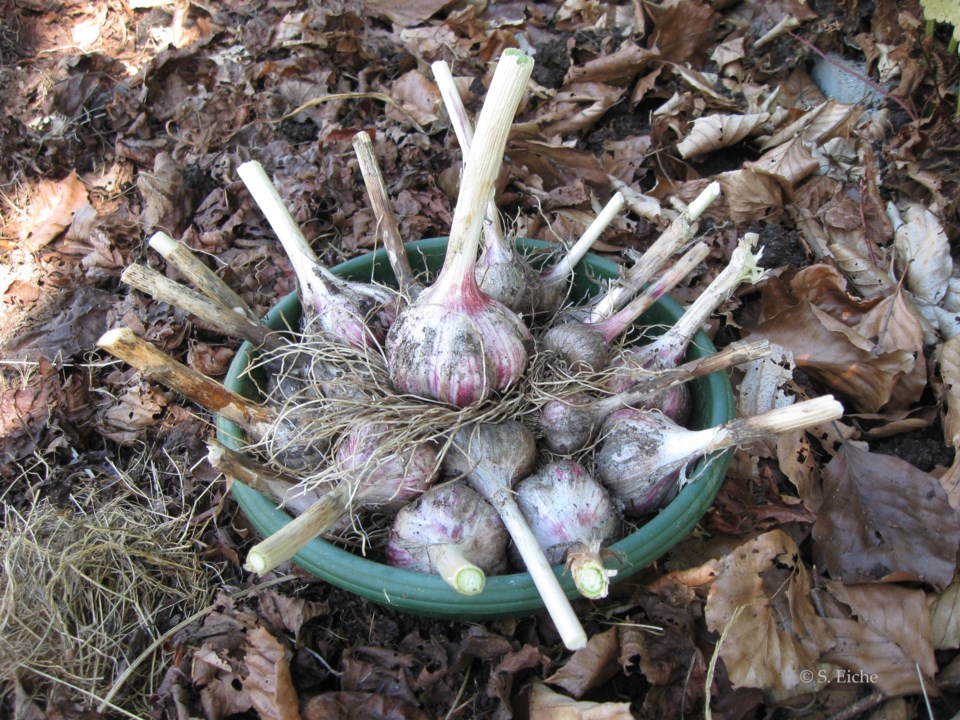I’m not sure where or when I first tasted garlic. What I know for sure is that it wasn’t at home.
My mother cooked what my father liked, and he liked what his mother had cooked, which meant German cuisine. Although garlic was not unheard of in Germany, the advice found in one of my mother’s cookbooks from 1958 (Das praktische neue Kochbuch) gives you a good idea of its reputation there.
Garlic, the housewife is cautioned, should be used very sparingly; in fact, it’s best to go no further than lightly rubbing the inside of the pot or bowl with it. I don’t think my mother even got that close to using garlic.
When I moved to Florence in 1976, I shopped in the outdoor markets and my own cooking was transformed from northern to southern European. But it wasn’t until one day in late spring that I had a garlic epiphany.
A Florentine farmer had fresh garlic at his stand. It had been pulled before the cloves could form. Suddenly, I understood the glorious magic of garlic. From my Italian friends, I learned to roast (not toast) slices of bread; let the bread and olive oil marry; and finally slice as much fresh garlic as was needed to cover the surface of the bread.
The first time I ate the garlic-covered, olive oil-coated roasted bread, the taste of garlic stayed with me well through morning coffee the following day. About a week later, my morning coffee had regained its pure coffee flavour, and I could eat all the raw garlic I wanted at any hour of the day.
For people who don’t like the smell of garlic, the company of a garlic gourmand can be a trial. Garlic can linger on the breath and also emanate from the pores of the skin. I found this to be an advantage because it helped to keep some pests, such as mosquitoes, at bay.
Since coming back to Canada, I’ve grown my own garlic and been able to eat some of it freshly pulled out of the ground at a time that’s earlier than its traditional harvest date. This year, I had no garlic in my garden, having failed to plant it in the fall.
I was resigned to being denied the extreme pleasure of eating the garden-fresh stuff. But then, a miracle – a kind-hearted soul heard my lament and minutes later presented me with not one but two heads of garlic. The soil was still clinging to them. It wasn’t the premature garlic I knew from Italy, but it couldn’t have been any fresher. I was enormously grateful.
Like that of most herbs, garlic’s history goes back thousands of years. The earliest physical evidence turned up when archaeologists found well-preserved garlic cloves in King Tutankhamen’s tomb in Egypt.
Ancient writers in both occidental and oriental cultures recorded the health benefits of garlic, notably for the upper airways and digestion. The ancient Greek physician Hippocrates (460-370 BC), sometimes called the Father of Medicine, famously said (in ancient Greek, of course): “Let food be thy medicine and medicine thy food.”
He was referring to the prevention of disease and the maintenance of good health. Garlic was among the foods that he recommended. Pliny the Elder (23 to 79 AD), an ancient Roman naturalist, considered garlic (drunk, eaten, or as an ointment) a cure for a whole catalogue of problems, including poisonous bites.
The Romans took garlic with them on their military expeditions to northern Europe and by medieval times, garlic was one of the herbs found in monastic herb gardens. In her book on natural history and healing (Physica), Saint Hildegard of Bingen (1098-1179), a German Benedictine nun, wrote that garlic was most effective when eaten raw. Garlic’s benefits continued to be studied in successive centuries, and its uses and preparations increased.
I’m definitely one with Saint Hildegard in praising raw garlic, but recently my sister-in-law shared a recipe with me for cooked garlic that I’d give four out of five stars to. It involves simmering cloves of garlic in olive oil, after which you re-use the garlic-infused oil and spread the cloves as garlic confit on bread.
Since garlic usually comes in a quantity larger than one, it ought to have a group noun. The sources provided no satisfactory answer to my search. So I’d like to propose a collective noun that I think fits the bill – henceforth I shall refer to a bunch, braid or entire field of garlic as a glory of garlic! Gloria is the Latin word that’s at the root of glory. It stands for fame, renown, great praise or honour. What could be more suitable?
Sabine Eiche is a local writer and art historian with a PhD from Princeton University. Her passions are writing for children and protecting nature. Her columns deal with a broad range of topics and often include etymology in order to shed extra light on the subject.
📣 Got an opinion on this story or any others in Richmond? Send us a letter or email your thoughts or story tips to [email protected].
📲 To stay updated on Richmond news, sign up for our daily headline newsletter.
💬 Words missing in article? Your adblocker might be preventing hyperlinked text from appearing.



